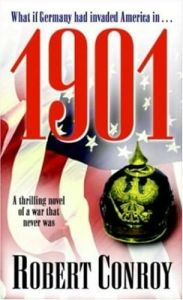1901

I love Alternative History. I know, what a shocker. A historian saying they enjoy reading Alternative History is like a fat man squeeling "I LOVES TWINKIES!!"
For those of you who don't know (and judging from sales figures that's most of the world), Alternative History is a sub-branch of Historical Fantasy. Essentially, an author takes a historic event and changes the result. The author then creates a "what if" tale, showing how history could have unfolded. It's sort of like applying chaos theory to linear time. Or what happens when a bunch of history geeks get together, drink too much, and say "What the hell would have happened if Napoleon had subdued Spain entirely BEFORE invading Russia?" Of course, to make the books more palatable to the general public, Alternative History often reads like John Jakes. Melodramatic storylines, often involving family rivalries or lost love, provide the narrative hook, while the inclusion of "real people" allows a "Hey, i remember that guy from 10th grade history class" epiphany for the reader. To be honest, one of the guilty pleasures of alternative fiction is watching the creative (and logical, within the confines of the "new history" of the story) ways in which the author "snuffs" real people in radically different ways than they actually died. I know, that's morbid and down-right creepy, but it's still fascinating.
Last week I picked up 1901 by Robert Conroy. I've never read Conroy before, but i had heard good things. Additionally, the novel's plot grabbed me. In a nutshell, 1901 asks what would have happened if Germany had invaded the United States in, you guessed it, 1901.
To give a little bit of context, at the turn of the century, the United States went to war with Spain after an American naval vessel, USS Maine, exploded while harbored in Havana. The Maine was there to "show the flag", as Spain was in the midst of suppressing a nasty little uprising on their colony of Cuba. American newspapers ran wild with stories of atrocities committed by Spanish soldiers upon the civilian population, so President McKinley ordered the Maine to Havana to observe the war. Once the Maine was destroyed, the newspapers (particularly those run by William Randolph Hearst) convinced the American people that the vessel had been targeted by a Spanish torpedo (what we would call a "mine" these days). A rather hurried naval investigation confirmed the allegation (which most likely was not true; the explosion on the Maine was probably the result of a coal fire in the engine room) and the US declared war on Cuba. In a few short months, the US army (including Teddy Roosevelt's famed "Rough Riders") had taken Cuba, while Admiral Dewey destroyed the Spanish fleet in the Pacific and seized the Philippines. In less than a year, the United States had the beginnings of a colonial empire. These new found territories, combined with the Panama Canal (which was in the planning stages), placed the United States on the world stage.
Conroy's novel springs out of the real life fact that Kaiser Wilhelm II of Germany asked his military leaders to draw up a war plan for a possible conflict with the United States. Wilhelm II was in eager young man; he was particularly eager for an empire. In the final decade of the 19th century he had built the German navy into one of the largest on the globe and created the second largest army in the world. By the turn of the century, Wilhelm was hungry for colonies. Historically, Wilhelm restrained his adolescent enthusiasm for military glory until a little known Serbian named Gavrilo Princip put a .32 caliber bullet through the throat of Archduke Franz Ferdinand. Within months, all of Europe was engulfed in the first World War.
Conroy's novel follows the historical war plan: an invasion and occupation of New York City, with a planned movement into New England. Wilhelm's plan was not to conquer the United States, but rather to seize the nation's financial capital, inflict heavy casualties upon the population, and bring McKinley to the negotiating table. In Conroy's novel, Wilhelm asks for Cuba, the Philippines, the planned Panama Canal, and the right for Germany to involve itself in pan-American affairs at its own whim. In short, Wilhelm wanted an instant Empire.
Now for the review...
Conroy is an...interesting writer. Allow me to explain: Conroy develops the story with a good, steady pace. The book is a page-turner. And Conroy does a good job of creating a believable "history" of the German/American war of 1901. What drags the book down is his characterization. Conroy, following the example of the Grand-master of Alternative History - Harry Turtledove - introduces a large cast of characters. This is a classic trope of Alt-History; lots of characters, spread out on all sides of the conflict, allowing the reader to watch the story unfold. Unfortunately, Conroy lacks Turtledove's talent for bringing characters to life. Almost every character in 1901 are walking, talking exposition machines. Even the romantic subplot feels "by the numbers." I will cut Conroy a little slack since 1901 was his first novel and, several years later, he did win the "Sideways" award for best Alt-History author of the year.
I plan on reading more of Conroy's books. As I've mentioned, Conroy has a real talent for action/adventure writing and plotting out interesting "histories." I just hope his characterization becomes a bit more believable and he gives his characters "room to breathe" rather than just to serve the mechanization of the plot.



Comments
Post a Comment